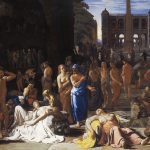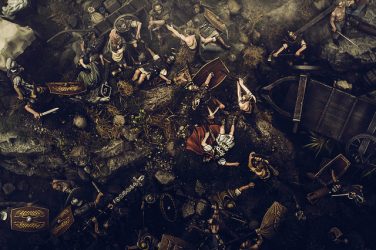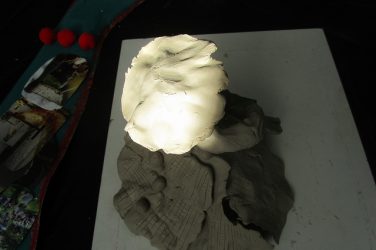In Alex’s surreal sketch we see a vision of Europe in the 23rd century under attack by a long forgotten people.
It is a busy day in Baris, the bureaucratic heart of the Faith Alliance, an intercontinental quasi-state, consisting of 28 congregations and ruling over Europe, the Middle East, parts of Africa and Asia: the 23rd century’s first and only global transnational union. The city streets are bustling with life among the dazzling gold-plated highrises housing the institutions of the Alliance. Sun-powered palanquins are hovering above the heads of the motley crowd, many of whose inhabitants occupy positions in the bloated bureaucracy. Peace has long been established in the world’s largest economy and a multi-office institutional behemoth, the Eye of God, has been set in motion to make sure the principles of the Alliance are propelled though the ages among believers and new converts. Nevertheless, troubling news have been coming in lately from the FA periphery, the borderline territories in the East integrated in the past few decades to stave off infidels, lurking in the deserts beyond the Alliance’s great wall. Infidels, the biggest pain in the ass of the Alliance, have been nibbling at its outer rim for years now, refusing to pledge allegiance to a benevolent master and showing their outright rejection of the Faith: their methods progressing in radical intent and skill.
Two palanquins meet in a silent side street and a tall, swarthy gentleman in an exquisite turban carefully jumps between vehicles. Judging by his attire, responding to the highest demands of the adab, he is either a top official or an intellectual: one of those well-paid HW (House of Wisdom) pundits gravitating towards the Eye of God and hired to preserve the ideological outlook of the Alliance, but in fact muddying its waters. His companion also appears to be a man of stature, his seemingly posh black tunic finished in an inimitable Luis Vuitton pattern. One is indeed a lobbyist and an expert on infidel diversion and the other a high-profile policy-maker at the CA (La Commission de l’Alliance).
The Expert starts speaking first: “Before we commence I would like to show you something, Monsieur, a trifle I have been instructed to offer you.” He takes a small valise out of his dress and works out the locking combination. What lays inside in a bed of black velvet is a single five-point star, apparently made of pure gold – it shines so brightly in the shaded palanquin interior that for a second the Policy-maker believes his soul has been touched by God. “Oh, you should not have. This must cost thousands of junckers!”, the latter exclaims. The Expert’s reply comes immediately: “It is a relic, indeed, part of the initial constellation, a token of appreciation on behalf of our supporters. Great work on the Sand Castle Directive.” A shadow passes through the Policy-makers face. “You know I was very conflicted about that; it was a tough decision: all those homes swept away for some sand-money.” “As I said, we fully appreciate your effort. You know there are only twelve of those, they only go to our closest associates”, reiterates the Expert showing his desire to close the matter.

The two opponents remain quiet for a while, not looking at each other, until finally the Policy-maker breaks the silence: “Let’s see what is the matter then. I am attending a cheese-manufacturers’ conference in half an hour, and I’d guess you have a good share of infidel trouble to deal with yourself”. “Well, that is actually what I wanted to speak to you about in the first place, Monsieur. I am sure some of the developments have caught your eye, this buffoonery is unmatched even in history books”. And he is right: for a few months now stories depicting badly dressed fanatics sweeping peaceful villages have been circulating the mainstream press, prompting a spreading debate on the potency of the threat. ShakirTube, to which the infidels have somehow gained access, has also yield its fair load of unshaved villain selfies. “But how one succumbs to such primeval impulses of barbarism?!” suddenly exclaims the Policy-maker. “Faith, Monsieur, they consider it a God’s calling to liberate fellow believers from a religious oppression, and I am afraid they also consider us, the Alliance and its people, as their primary target.”
After a brief silence the Policy-maker speaks again: “Can you explain to me how it has come to this, we have been taking pains to accommodate these cultures for decades, even here, in the heart of the Alliance, they are integrated in the workforce and are able to practice their rituals in peace. We have also spend millions of junckers to keep their societies apace in the overseas territories. What more do they want?!”. The Expert ruminates for a while before laying out his thesis to the state official: “If you ask me, Monsieur, there is more to it than just fanaticism – a heightened sense of personal piety is there of course, but I believe what has driven those people over the edge has something to do with their subpar social conditions.” “What do you mean?” “Well, reports say that the first wave of barbarians that came to the gates of Ruma were more a pitiable, than an admirable foe – they were emaciated and appeared as if they never knew the gift of running water; soldiers did not know whether to fight them, or to feed them.” “I am afraid this sort of mindless rage has been gestating in the deserts for quite a while now, they have dreamt about their past glories on the European continent ever since we pushed them out of it centuries ago.”
One question remains to be clarified and the Policy-maker asks it with a fair share of reluctance: “How well are the infidels organised?” “I am afraid they have made considerable progress, Monsieur. They appear out of nowhere in the hearts of our capitals, as if they have mastered the art of personal transportation; they even use gender as a cover, bending it to their taste to avoid detection – an archaic diversion technique they have honed to perfection.” “What is worse, they have started building what appears to be a political organisation, which they have named, rather trivially, as Neuropa. Intel also says those, for lack of a better term, Neuropeans have been receiving aid from the jungle republics in the Americas and some of our own member-congregations.”
The Policy-maker sinks in his seat. Bad news indeed. So, it is true. After centuries of well-kept peace, the infidels, calling themselves “Neuropeans”, have re-organised and have risen to claim something, that was previously theirs, but which they were simply unable to run too well. How is he supposed to break this down to the public? And what about politics – the sheer thought of gathering the 28 heads of congregation and striking a common deal made his head spin. Of course, some of them will eventually stand on his side but that will not solve the problem – it might take months, even years to reach a decision, hundreds of regulations on carbohydrate content will be passed before there is a definitive progress on such a convoluted issue.
Suddenly, the intense high-pitched sound of a trumpet comes out of a nearby window, reminding the Policy-maker that he has to go. The goddamn music hour. On his way out he asks the Expert about his role in the infidel business. “Just stick to the routine, adopt some rules, relax. We will get back to you when the time comes, Monsieur.” Hours later, in high spirits and at a rich table with his benefactors, the Expert has a vague recollection of how easily he was able to fool the official. Neuropa, my socks.
Photo: Evelyn Berg (Flickr); Licence: CC BY-NC-ND 2.0










